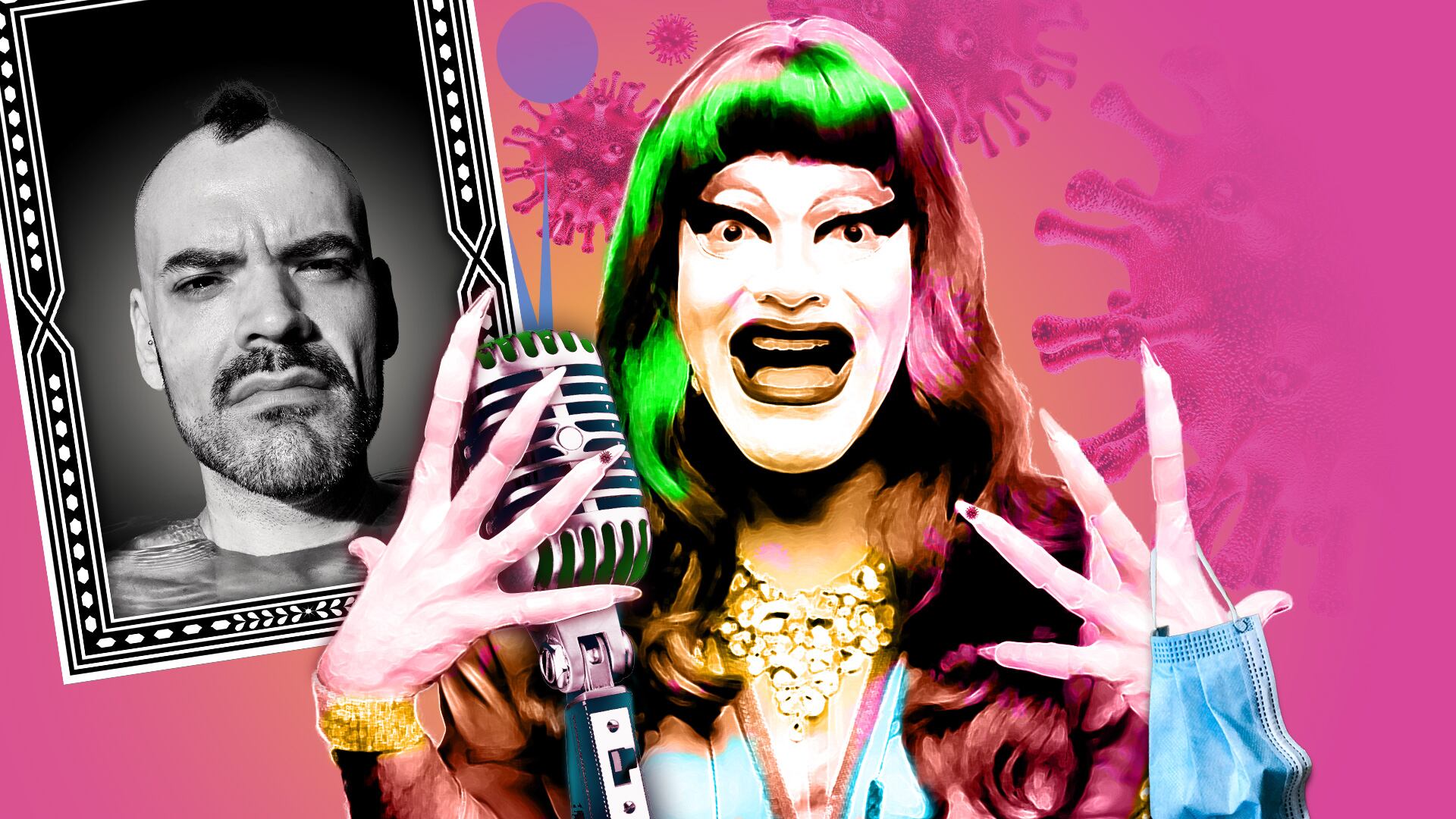Anthony Hudson has always stepped onto the stage wearing the masks of both tragedy and comedy—and if it’s as Carla Rossi, you can bet she stole those masks.
Known as Portland’s premier drag clown, Hudson’s alter ego is at once a trickster, a rich white lady from Lake Oswego and somehow still maintains bits of Hudson the artist, so any performance Hudson writes for her is bound to be layered, highly referential and hilarious. About 10 minutes after it ends, it might also strike as deeply thought-provoking.
Last year, when the world capsized, Hudson’s grand realization of a fully staged production of Looking for Tiger Lily—unpacking Hudson’s experience of growing up Indigenous and queer while surrounded by images of whiteness and heteronormity—appeared to sink. But thanks to Artists Repertory Theatre’s Mercury Company, Hudson is returning with two new pieces: a radio drama called The Carlalogues and an accompanying recording of Hudson’s monologue, Nobody’s going to fund this. One ticket buys you both.
Hudson spoke to WW about the new project, the pandemic and the instruments of torture a drag clown wields to kidnap her audience.
WW: Before we get started, you said you couldn’t talk long because you have to get into drag for Zoom performances. What’s that about?
Anthony Hudson: Carla is doing a 10-minute land acknowledgment at a fundraiser for Five Oaks Museum, in conjunction with their This IS Kalapuyan Land exhibition, curated by Steph Littlebird—who is a Kalapuyan descendant, same as me. Carla will reflect on what she, a white arts administrator, has learned during the racial reckoning of the last year.
I haven’t been doing a lot of virtual gigs. I’ve added like five makeup wipes to my stack of Carla faces in the last year. I just don’t get juiced doing a Zoom performance unless it’s something I really love, like working on something that’s tribal based. Otherwise, I’m just kind of not here for it.
Do you mean you don’t want to perform as Carla or you don’t want to perform at all?
It’s just performing in the Zoom format. Carla is a clown and she needs live people to really activate the troll. When I intentionally create something for Zoom, I’m always thinking, “How can we intentionally create a piece about the failings of this medium?”
What can people expect from The Carlalogues?
The premise of Carlalogues is that Carla is sick of the pandemic. She’s stuck in her house—excuse me, her castle in Lake Oswego. She feels ignored. She needs an audience. Zoom won’t work for her. She basically kidnaps all these people out of their homes, in the middle of the night, breaks into a nightclub, and ties them all to chairs. She then performs an entire one-woman show. To facilitate the process, there’s a cattle prod, duct tape and other implements of torture. It’s an absolutely bonkers show.
And it just plays, radio drama style. Is that complete with Foley sounds?
Oh yeah. Our sound designer Rodolfo Ortega went out of this world, running up and down stairs, recording cattle prod sounds. Basically everyone on staff at Artists Rep, at one point or another, duct-taped their mouth shut—and sometimes even their families’ mouths—and recorded themselves jostling in their seats, trying to ask for help.
When people buy a ticket to this show, they’ll also get an audio version of Nobody’s going to fund this, which is a more somber reflection on the pandemic. Did you intend that both pieces would be considered together?
It was a happy accident. Originally, I just pitched Carlalogues. However, Luan Schooler, who I’ve been working with at Artists Rep for years, read Nobody’s going to fund this and immediately asked if I’d be open to recording an audio essay of it. I’m really proud of both pieces, and I think it’s nice to see them next to each other. Carlalogues is what people are more used to having with me. The other is a more vulnerable Anthony piece—more personal, more sad, more bittersweet. It’s a little messed-up manifesto for moving forward, as an artist, in the future. It’s appropriate to offer these two viewpoints on the weird year we’ve all suffered through.
Are either of these pieces related to Looking for Tiger Lily, the full stage production you were meant to perform last year?
Yeah, I had so much lined up right before the pandemic hit. There was the play of Tiger Lily. There was a premiere of a new piece about Valerie Solanas at Reed College. Then there was the fifth anniversary of Queer Horror at the Hollywood. All those things were happening in the same month. It reminds me of that documentary Joan Rivers: A Piece of Work. I was so inspired by the scene where she flips through her day planner and shows all the dates that are booked. She says, “This is happiness.” And then she flips forward to the dates that are empty and says, “This is fear. This is horror.” And that has been my modus operandi for a long time: just keeping myself as busy as possible. I got onto 40 airplanes in 2019. So when everything got postponed or canceled, I suddenly had nothing but room to think.
Nobody’s going to fund this was me asking myself: Am I in an abusive relationship with my work? Am I in an abusive relationship with institutions and granting cycles? Nobody’s going to fund this is a challenge, to myself, not to perpetuate the cycles of overworking—the idea that the show must go on—because that’s just toxic, when you get down to it.
I mourn that Valerie Solanas piece.
Reed is still committed to making it happen. I told them I would only be able to do it live. I’m also restructuring how I see that shit in my head and my relationship to Valerie. My misanthropy is at an all-time high.
What is amping up your misanthropy more than usual?
The pandemic was—look, I’ve already put the pandemic in past tense.
It’s still going.
It’s still going, and we’re pretending it’s over. It’s ravaging the world. We’re lucky enough to get vaccines, those of us that choose to get them. People are calling it “a moment of pause,” even though there was also an expectation that we didn’t stop working. I don’t want us to miss an opportunity to massively restructure a huge amount of systemic problems in this country—in art, in government, and social justice.
But I think our desire to return to normalcy, our desire to just get back to work, will win out. To make the billionaire overlord oppressors richer. I’ve seen a lot of people speaking of change. I’ve seen amazing movements and acts of defiance. I don’t want to see that go away, and I’m afraid it’s going to go away.
WATCH: The Carlalogues streams at 7 pm Saturday, May 22. The Carlalogues and Nobody’s going to fund this stream on the Artists Repertory Theatre site starting May 24. See artistsrep.org/performance/the-carlalogues for tickets and streaming information.

